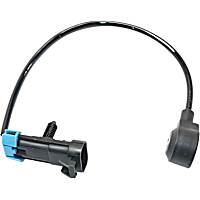If you own a 2016 to 2018 Chevy Malibu, there’s a chance that you may have encountered a ”reduced engine power” or “engine power reduced” warning at some point. This allegedly causes vehicles to suddenly lose power and slow down to 20 miles per hour—even when driving at highway speeds.
The problem has been a major cause for concern for many Chevy Malibu owners due to its high-risk nature, as the loss of power makes drivers unable to accelerate to a safe speed. And with affected vehicle owners unable to get acceptable answers to the issue, many have decided to take legal action against General Motors (GM).

Engine Power Reduced on Chevrolet Malibu Vehicles Reported
Federal regulators, such as the National Highway Transportation Safety Administration (NHTSA), have received multiple complaints about a potentially dangerous engine flaw in 2016-2018 Chevrolet Malibu vehicles. This alleged defect is said to involve the accelerator pedal position sensor and can cause an unexpected loss of engine power.
In many of the accounts, the drivers were said to be driving at highway speeds, when all of a sudden, their vehicles abruptly slowed down to 20 to 40 miles per hour. Some had to drive along the highway at dangerously slow speeds.

Many affected drivers said that the “engine power reduced” warning appeared on their instrument panel or dashboard when the problem occurred. They also reported that the warning continued to appear even after restarting the engine.
Some drivers claimed that they were able to drive at normal speeds again after turning off the ignition and restarting the vehicle. Others found that the accelerator pedal position sensor failed entirely and would not work even after the engine had been restarted.
In search of a solution to the problem, some Chevy Malibu owners went to their respective dealerships to report the problem. However, they were told that nothing was wrong with the sensor. In fact, GM did not offer an improved sensor that resolves the issue. Some drivers even reported that when they requested a replacement sensor, dealerships told them that the parts were on backorder.
As for those who were able to get replacements for the offending pedal position sensor, some found that the fix was ineffective and that they continued to experience the same problem.
These recurring issues indicate that GM has either been allegedly removing faulty sensors and replacing them with an unimproved version or incorrectly diagnosing the problem. This issue also indicates that GM may be employing a band-aid solution to address the problem.
The NHTSA has yet to open an investigation regarding the affected models. GM also hasn’t announced any plans to recall Chevy Malibu units affected by the Engine Power Reduced issue.

Chevy Malibu Class Action Lawsuit: Rothschild v. General Motors LLC
The alleged pedal position sensor defect in affected Chevy Malibus that caused them to go into Engine Power Reduced mode has affected so many drivers that a class action lawsuit has been filed.
According to the GM engine defect class action, the plaintiff, Mr. Mark Rothschild, had purchased a 2017 Chevy Malibu in September 2017. In March 2018, while Mr. Rothschild was driving along a highway, the vehicle allegedly displayed an “engine power reduced” warning and restricted its speed to around 20 mph.
Rothschild was able to navigate his vehicle away from traffic and get out of the incident unscathed.
Following the incident, Rothschild brought his vehicle to a GM dealership where the accelerator pedal (and integrated sensor) was replaced under warranty. A year later, he experienced the same defect and went to the dealership again, only to be denied coverage for the cost of repairs. He went to GM corporate but wasn’t given any assistance on the matter. In the end, he paid over $200 in repairs at a different mechanic shop.
In July 2019, Rothschild encountered the same issue and went back to the mechanic he went to the previous year. Since the repair was under warranty, he did not have to pay the second time around.
However, he has not received any reimbursement for his out of pocket expenses.

Many 2016-2018 Chevy Malibu owners claimed to have experienced the same issue. GM reportedly found out about the alleged defect through these complaints but has failed to inform the consumers and recall the defective parts.
Rothschild aims to represent a class of consumers who purchased or leased 2016-2018 Chevy Malibu vehicles. He also seeks to represent a subclass of the same consumers from New York.
The GM engine defect class action lawsuit seeks actual damages, punitive damages, statutory damages, disgorgement, interest, restitution, court costs, and attorney’s fees.
Mr. Rothschild and the proposed class are represented by Nicholas A. Migliaccio, Jason S. Rathod, and Esfand Y. Nafisi of Migliaccio & Rathod LLP; and Daniel Levin and Nicholas Elia of Levin Sedran and Berman.
The Rothschild v. General Motors LLC Chevy Malibu Class Action Lawsuit is filed in the US District Court for the Eastern District of New York under case number 1:19-CV-05240.
For more information about a possible claim, you may fill out the contact form on this website.

What Does “Engine Power Reduced” Mean?
If you encounter the “reduced engine power” warning light on your dashboard or instrument panel, in most cases, the warning indicates that your car’s performance has been intentionally limited. Your car’s primary computer, often known as the powertrain control module (PCM), triggers Reduced Power Mode when it detects a system failure.
There are also some instances where the light may turn on when the PCM detects a noticeable reduction in the vehicle’s performance due to an underlying concern.
The Engine Power Reduced Mode may restrict your vehicle’s performance and ability to accelerate. In some cases, the vehicle may become undrivable, because the PCM has cut off fuel delivery to the engine.
There are many possible causes behind the “reduced engine power” warning. In the case of the affected Chevy Malibu vehicles included in the class-action lawsuit, the issue is supposedly triggered by a defective accelerator pedal position sensor, which is part of the electronic throttle actuator control (TAC) system.

Are There Any Recalls or Technical Service Bulletins for Affected Chevy Malibu Vehicles?
On August 28, 2019, GM issued a Special Coverage Adjustment (#N182188250-01) that may have been designed to address the issue regarding the Engine Power Reduced mode on Chevy Malibu vehicles. This document extends the warranty on the accelerator pedal position sensor to 10 years or 150,000 miles from the date the vehicle was first placed in service.
This coverage adjustment applies to 2016-2018 Chevrolet Malibu units, as well as 2017-2018 Buick LaCross and 2018 Buick Regal units.
There is also a technical service bulletin (TSB) that addresses the Engine Power Reduced issue on 2018 Chevy Malibus. However, the specifics are not the same as those encountered by the drivers involved in the lawsuit against GM. Instead of a faulty accelerator pedal position sensor, TSB 19-NA-032 concludes that the problem is being caused by a software anomaly.
This TSB suggests reprogramming the engine control module (ECM) or swapping electrical connectors between the knock sensors as possible solutions.
To check if your vehicle has an open recall, you can go to the NHTSA website and enter your vehicle’s 17-digit identification number (VIN). If you don’t know where to find this, check out our article on all the places you can find your VIN number.
If your vehicle doesn’t appear, this means there are no recalls for your specific make and model. However, it is advised that you check the website from time to time as vehicle manufacturers update the status of recalls regularly.
Regular vehicle maintenance and inspection can help you spot problems in your vehicle before they start getting worse. Your owner’s manual should have information on the recommended service intervals, maintenance, and care.
Products Mentioned in this Guide
Any information provided on this Website is for informational purposes only and is not intended to replace consultation with a professional mechanic. The accuracy and timeliness of the information may change from the time of publication.

 Accelerator Pedal Position Sensor
Accelerator Pedal Position Sensor
 Knock Sensor
Knock Sensor














How can someone join? I am having this same issue and it is so scary an unsafe